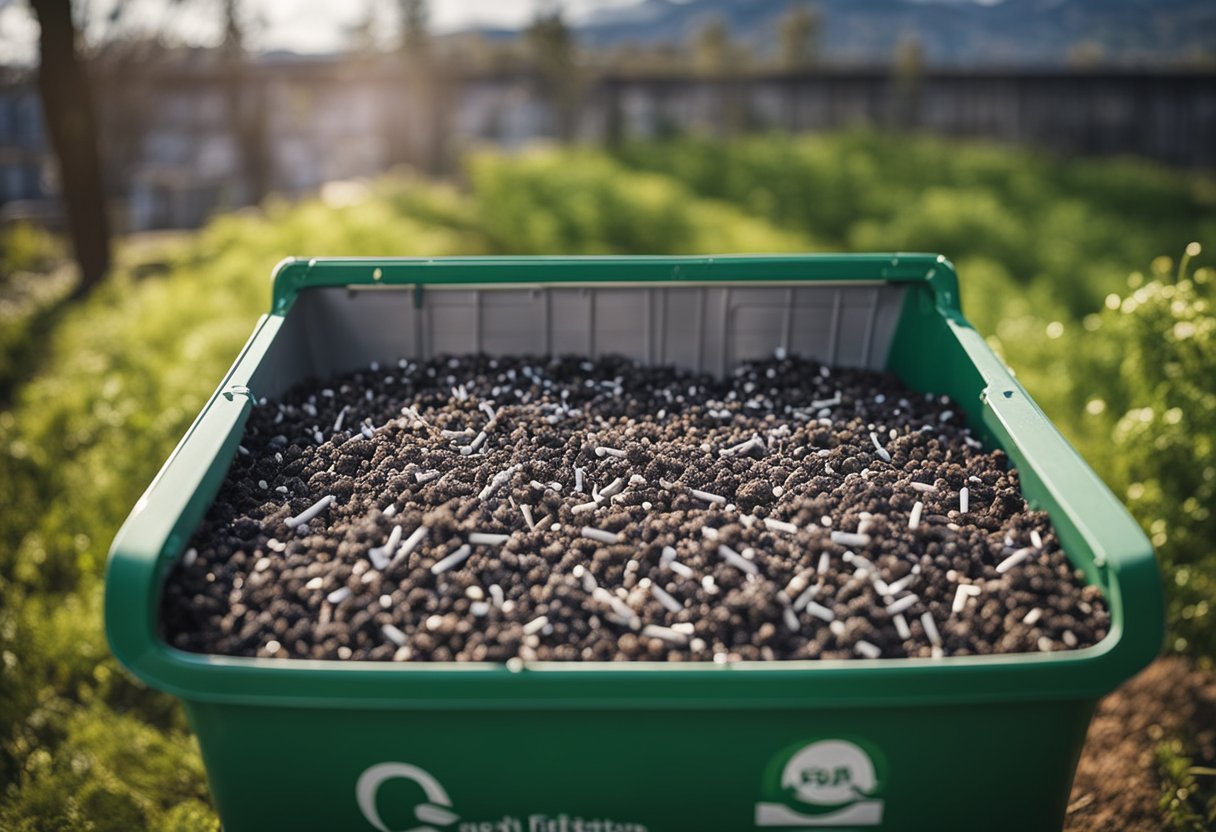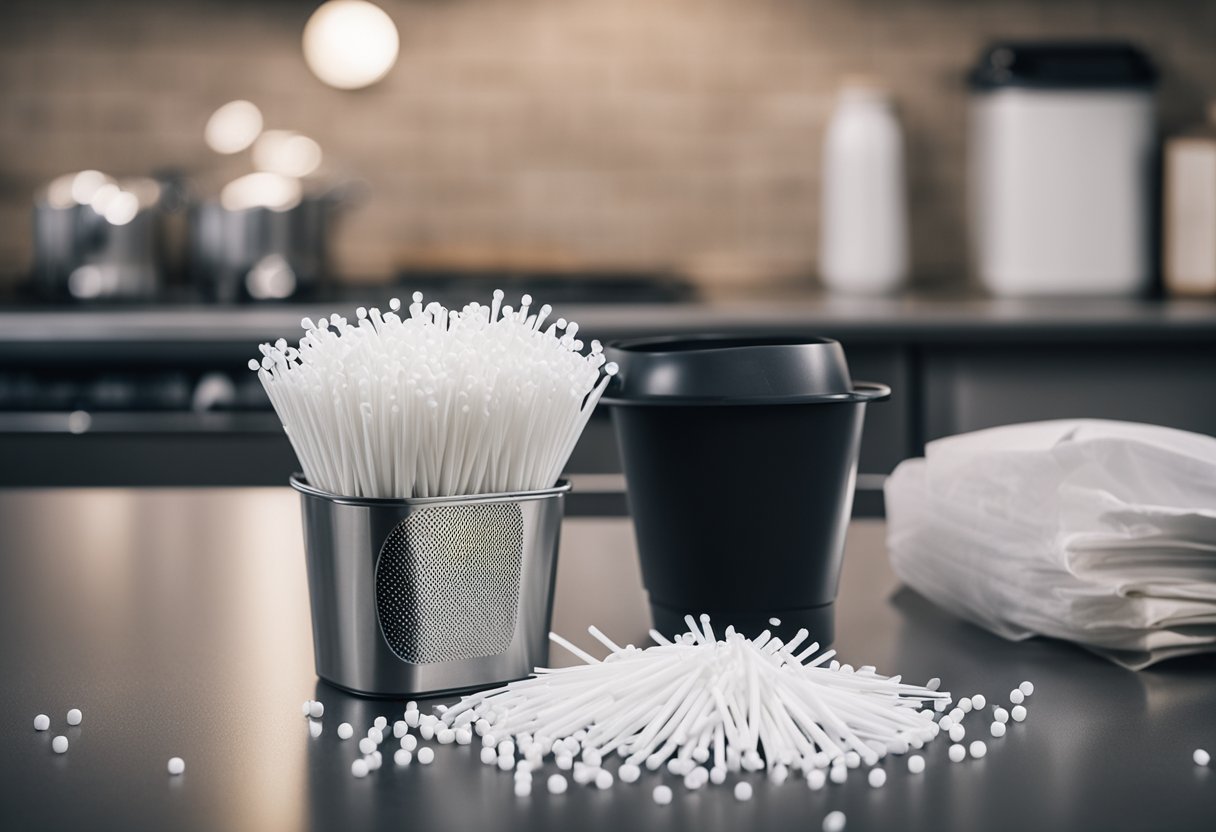As an Amazon Associate I earn from qualifying purchases.
At A Glance
Whether or not you can compost Q-tips depends on the materials they are made from. If the Q-tip stems are made from paper or wood, they are compostable. However, if they are made from plastic, they are not suitable for composting. It’s advisable to check the packaging or contact the manufacturer to determine the material composition. For the cotton part, as long as it’s 100% cotton and hasn’t been in contact with harmful chemicals, it can be composted. If composting, it’s a good practice to cut or break the Q-tips into smaller pieces to expedite the decomposition process.
Composting is an eco-friendly way to recycle various materials, but when it comes to Q-tips, caution is advised. Q-tips are commonly used in households for personal hygiene purposes. However, when it comes to disposing of them, it can be confusing to know whether or not they can be composted. In this article, I will explore whether or not Q-tips can be composted and provide you with some tips on how to properly dispose of them.
Most traditional cotton swabs consist of a plastic stick with a small amount of cotton at one end. Therefore, it is important to understand their composition before determining if they can be composted. While some cotton swabs are made from biodegradable materials and can be composted, many contain plastic components that do not break down in a typical compost pile. In this article, I will provide you with some guidelines on how to determine whether or not your Q-tips can be composted and how to properly dispose of them if they cannot.
Understanding Q-Tips

Q-tips, also known as cotton swabs, are commonly used for various purposes, including personal hygiene, cleaning, and makeup application. They consist of two main materials, cotton and plastic. The cotton is used to form the tip and can be made of 100% pure cotton, bonded paper, or other materials. The plastic or paper stick is used as a handle to hold the cotton tip.
Materials Used in Q-Tips
The cotton used in Q-tips is typically made from natural fibers and is generally biodegradable. However, some Q-tips may contain synthetic fibers or other materials that are not biodegradable. It is important to check the packaging or manufacturer’s instructions to determine the composition of the Q-tips.
The plastic or paper sticks used in Q-tips are not biodegradable and should not be composted. The plastic sticks can also contaminate the resulting soil if they are composted. Therefore, it is recommended to remove the cotton tips from the plastic or paper sticks before composting.
Types of Q-Tips
There are several types of Q-tips available in the market, including compostable cotton swabs and biodegradable Q-tips. Compostable cotton swabs are made from organic cotton and are designed to break down in a composting environment. Biodegradable Q-tips are made from materials that can decompose naturally over time.
It is important to note that not all Q-tips are compostable or biodegradable. Some Q-tips may contain plastic sticks or synthetic fibers that do not break down in the composting process. Therefore, it is important to check the packaging or manufacturer’s instructions to determine if the Q-tips are compostable or biodegradable.
Overall, Q-tips can be composted if they are made from biodegradable materials and the plastic sticks are removed. However, it is important to ensure that the Q-tips are not contaminated with any harmful chemicals or substances before composting.
Basics of Composting
What is Composting?
Composting is the process of breaking down organic matter into nutrient-rich soil. This process is done by microorganisms such as bacteria, fungi, and other decomposers that feed on the organic matter and break it down into simpler compounds. Composting is a natural process that occurs in nature, but it can also be done in a controlled environment such as a compost pile or bin.
Composting Materials
To create a compost pile, you need to gather organic matter such as vegetable scraps, coffee grounds, cardboard, hair, and stale bread. These materials are considered “green” or nitrogen-rich materials. You also need “brown” or carbon-rich materials such as leaves, wood chips, and straw.
It is important to have a balance of both green and brown materials in your compost pile. The ratio should be roughly 2:1 brown to green. This balance will help your compost pile break down faster and prevent it from becoming too wet or too dry.
In addition to organic matter, you also need air and water. The microorganisms that break down the organic matter need oxygen to survive, so it is important to turn your compost pile regularly to allow air to circulate. Water is also necessary to keep the compost pile moist, but not too wet.
Creating a compost pile is an easy and effective way to reduce waste and create nutrient-rich soil for your garden. By using natural materials and allowing microorganisms to do the work, you can create a sustainable and eco-friendly way to dispose of organic waste.
Can You Compost Q-Tips?
As someone who is environmentally conscious, you may be wondering whether q-tips are compostable. The answer is not as straightforward as a simple yes or no, but there are some things you should consider before composting q-tips.
Composting Cotton Swabs
If you want to compost cotton swabs, it is important to ensure that they are made of 100% organic cotton and do not contain any traces of plastic. You can snip the cotton, break the stem, and add them to the regular compost pile. However, if the cotton swabs have plastic sticks, they cannot be composted.
Composting Biodegradable Q-Tips
Some q-tips are marketed as biodegradable or compostable. However, it is important to read the label carefully to ensure that they are indeed compostable and biodegradable. If the q-tips are made of biodegradable materials, such as bamboo or paper, they can be composted. However, if they contain any plastic, they cannot be composted.
When adding q-tips to your compost pile or bin, ensure that they are mixed well with other organic matter such as fruit and vegetable scraps, yard trimmings, and leaves. It is also important to note that q-tips take a long time to decompose, so you may want to shred the cotton parts for faster decomposition.
In conclusion, q-tips can be composted if they are made of 100% organic cotton and do not contain any traces of plastic. Biodegradable q-tips can also be composted if they are made of biodegradable materials and do not contain any plastic. However, it is important to read the label carefully before composting q-tips.
Environmental Impact

Q-tips have an environmental impact and should be disposed of properly. Here are some important things to consider when disposing of Q-tips.
Q-Tips and Landfills
Q-tips that are not disposed of properly can end up in landfills where they do not decompose properly. This can lead to methane emissions, which contribute to climate change. Additionally, Q-tips can pose a threat to marine and human life if they end up in bodies of water.
Composting vs. Regular Waste Bin
Composting is an eco-friendly way to recycle various materials, but when it comes to Q-tips, caution is advised. Traditional Q-tips with plastic handles are not suitable for composting due to their non-biodegradable nature and potential environmental hazards associated with them. However, eco-friendly options are available on the market that allow you to reduce waste and support sustainability efforts. If you have these types of Q-tips, they can be added to a compost bin since they are made of biodegradable materials.
Sustainable Living
Sustainable living is an important aspect of reducing our environmental impact. By properly disposing of Q-tips and other materials, we can help reduce the amount of waste that ends up in landfills and contributes to climate change. Additionally, by choosing eco-friendly options when available, we can support sustainability efforts and reduce our carbon footprint.
Alternatives to Q-Tips
Reusable Options
If you’re looking for a more sustainable option than single-use cotton swabs, there are a few reusable options available. One popular choice is the LastSwab, a reusable swab made from durable materials that can be washed and used again and again. Another option is the Humble Co. reusable cotton swab, which is made from bamboo and comes in a biodegradable carrying case.
Sustainable Brands
If you’re interested in supporting sustainable brands, there are several companies that offer eco-friendly alternatives to Q-tips. For example, Lüfka, a zero-waste shop in Tampa, Florida, makes its own version of reusable Q-tips. They are made with anti-bacterial bamboo sticks and soft silicone tips (in different styles). The swabs come in a set of four, are packaged in a bamboo carrying case, and shipped without any plastic.
When it comes to disposable options, there are also some sustainable brands to consider. For example, some toothbrush companies, such as Humble Brush and Brush with Bamboo, also offer eco-friendly cotton swabs made from bamboo. Additionally, some companies offer washcloths made from natural fibers, such as wool or silk, that can be used to clean ears instead of cotton swabs.
In conclusion, while Q-tips can be composted, there are many alternatives available that are more sustainable and eco-friendly. Whether you choose a reusable option or opt for a product from a sustainable brand, there are plenty of ways to reduce your environmental impact and still keep your ears clean.
Composting Q-Tips in Your Garden
If you’re looking for ways to reduce waste and recycle materials, composting is a great option. However, not all materials are suitable for composting, including Q-tips. Q-tips often contain plastic components that do not break down in a typical compost pile.
To compost Q-tips, it’s essential to use biodegradable Q-tips made from organic cotton fibers and bamboo sticks. These types of Q-tips can indeed be composted, but it’s essential to check the packaging or manufacturer’s instructions before doing so.
Using Compost as Fertilizer
Compost is a nutrient-rich soil amendment that can be used as a natural fertilizer for your garden. Adding compost to your soil can help improve soil structure, increase water retention, and provide essential nutrients for plant growth.
To use compost as fertilizer, spread a layer of compost over your garden soil and mix it into the top few inches of soil. This will help ensure that the compost is evenly distributed throughout the soil and will provide nutrients to your plants as they grow.
Enriching Soil with Compost
In addition to using compost as fertilizer, you can also use it to enrich your soil. Enriching soil with compost can help improve soil quality, increase soil fertility, and promote healthy plant growth.
To enrich your soil with compost, spread a layer of compost over your garden soil and mix it into the top few inches of soil. This will help improve soil structure, increase water retention, and provide essential nutrients for plant growth.
Overall, composting is an eco-friendly way to recycle materials and reduce waste. While Q-tips are not suitable for composting, biodegradable Q-tips made from organic cotton fibers and bamboo sticks can be composted. By using compost as fertilizer and enriching your soil with compost, you can promote healthy plant growth and create a nutrient-rich environment for your garden.
